LATEST INSIGHTS
Your Present Location: LATEST INSIGHTS-
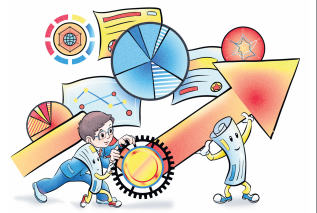
William Jones: Friendly law will attract more investors
As the Ministry of Commerce noted recently, with the Chinese market further opening up to foreign investment, the commitment to fully implement the new Foreign Investment Law, enacted in January, will prove critical. Given the attempts of the United States president and other leaders to blame China for the US administration's lackadaisical response to the novel coronavirus pandemic, Washington will pressure American (and perhaps European) enterprises to "disinvest" from China for alleged "national security" reasons.
2020-05-25 -
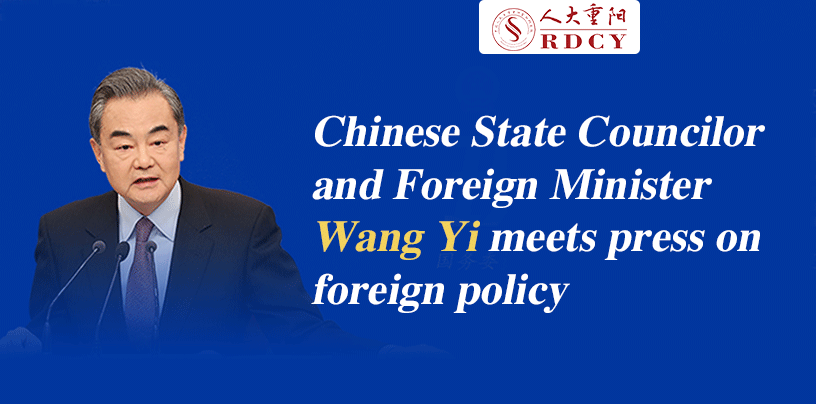
Highlights of press conference on China's foreign policy and diplomatic relations
Chinese State Councilor and Foreign Minister Wang Yi takes questions from reporters at a news conference on May 24 in Beijing. The news briefing is on the sidelines as China's top political advisory body, the Chinese People's Political Consultative Conference National Committee, and the top legislature, the National People's Congress, gather for annual sessions.
2020-05-24 -
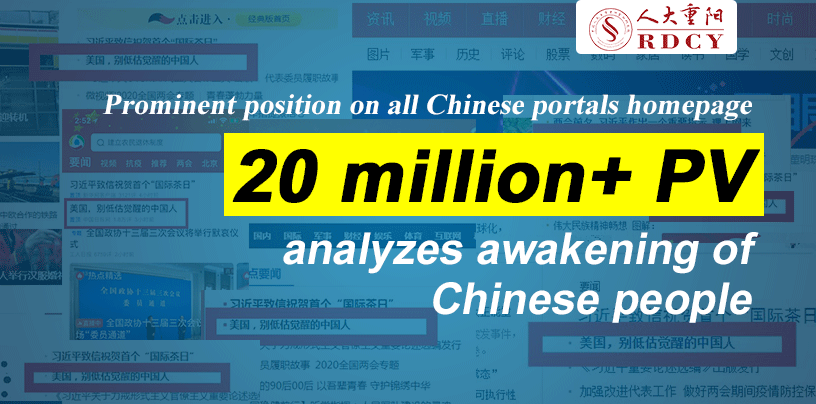
Prominent position on all Chinese portals homepage, 20 million+ PV, analyzes awakening of Chinese people
The Wechat official account of Chongyang Institute for Financial Studies at Renmin University of China (RDCY) reprinted an article entitled "Never underestimate awakening of Chinese people" in Chinese and English edition writtern by Wang Wen, executive dean of RDCY, which originally published in the column “Wang Wen on Changing World” in Global Times (English edition) on Tuesday.
2020-05-23 -

Experts cast doubts on US handling of the crisis and vaccine claim
As President Donald Trump said the United States started to develop a candidate for the first COVID-19 vaccine on Jan 11, experts questioned the administration's handling of the crisis even though it had early knowledge of the impending pandemic.
2020-05-22 -
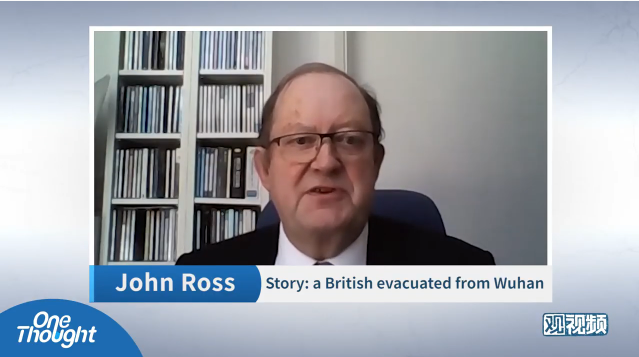
John Ross: "Wuhan Virus?", Massive Propaganda carried on by US against China
A Briton who was evacuated from Wuhan claimed that he regretted, that the situation in Wuhan, China is now way better than UK, USA and most of the countries. John Ross, Senior Fellow of Chiongyang Institute for Financial Studies at Renmin University of China, summarizes the statistics of infection and death toll around the world in this video.
2020-05-22 -
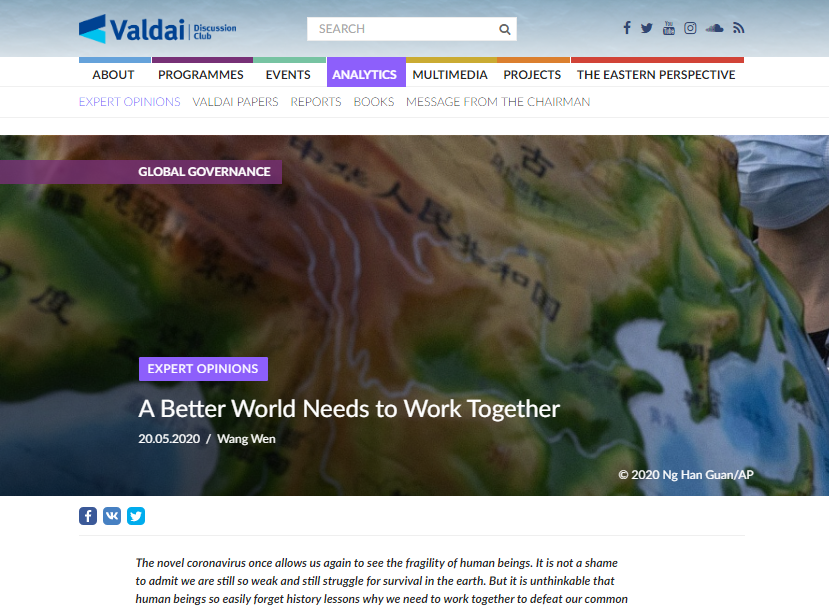
Wang Wen: A Better World Needs to Work Together
The novel coronavirus once allows us again to see the fragility of human beings. It is not a shame to admit we are still so weak and still struggle for survival in the earth. But it is unthinkable that human beings so easily forget history lessons why we need to work together to defeat our common threat, writes Wang Wen, Executive Dean of Chongyang Institute for Financial Studies (RDCY), Deputy Dean of Silk Road School, Renmin University of China.
2020-05-21 -
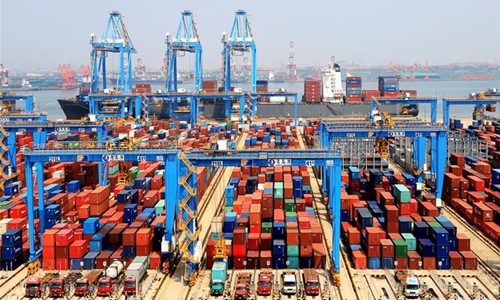
Possible change points to rising risks, offers room for policy maneuvers
One of the most closely watched aspects of China's two sessions each year is the release of the official target for GDP growth, a reliable indicator of where the world's second-largest economy is headed.
2020-05-20 -

Experts cast doubts on US vaccine claim
Relations between the WHO and the US have soured after Trump accused the global health body of mismanaging the pandemic and for being "China-centric". Trump has also ordered US funding to the WHO to be halted. The moves have been widely viewed as a way of deflecting attention from the US government's poor handling of the pandemic at home.
2020-05-20 -
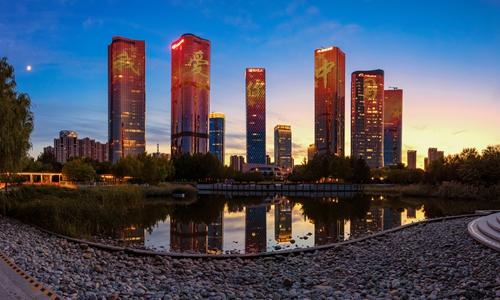
Wang Wen: Never underestimate awakening of Chinese people
I live in Wangjing, a quite internationalized area in Beijing. Many Fortune 500 companies are headquartered there, and 10 percent of the around 600,000 residents are expats. Every weekend, I take walks in Wangjing's many parks to exercise and watch the changes in the city.
2020-05-19 -

China and EU should rally together on virus: former Slovenia president
The year 2020 is regarded as a critical year for China-EU relations. How will the COVID-19 pandemic affect Europe's overall position on China? How can China and the EU work together to help the world overcome the challenge? Global Times (GT) reporter Li Qingqing interviewed Professor Danilo Türk (Türk), former president of the Republic of Slovenia from 2007 to 2012 and a senior visiting fellow at the Chongyang Institute for Financial Studies, Renmin University of China, on these issues.
2020-05-19 -
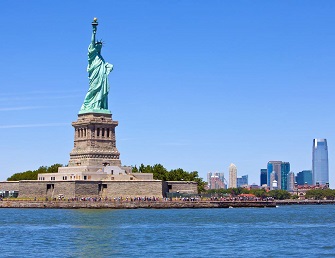
William Jones: US 'the beacon of hope' has lost its way, headed toward self-destruction
Many international observers have been shocked when they look at the US and see, in the midst of the greatest pandemic since last century, dumbfounding acts: university students romping on the beaches, demonstrators at state capitols without masks demanding an end to quarantine measures, and fake social media campaigns warning about the dangers of being vaccinated. Is this a society gone mad and plunging toward its own destruction?
2020-05-18 -
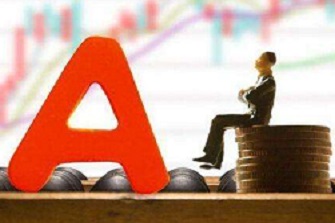
Will the COVID-19 pandemic reaffirm the dollar's reserve currency dominance?
The coronavirus pandemic has spooked the global financial markets and created a skyrocketing demand for the U.S. dollar as investors rush to safety. Some consider the dollar's reserve currency status was reaffirmed as the U.S. Federal Reserve embarked on large scale currency swaps to provide liquidity to central banks around the world, while others think the other way.
2020-05-18 -
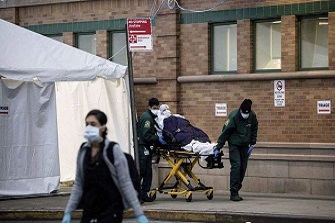
William Jones: Wuhan showed the way to beat the pandemic
The fundamental commitment of the authorities was to save as many lives as possible, and compared to the lives lost in the fight with the virus in other countries, not least of all, in the US, the cost for China in human life, while tragic, was far less. As the virus began to hit other countries, the "Wuhan model" became the paradigm. And as the fight subsided in China, Chinese teams were sent to other countries to aid them with equipment and with sound advice on combating the spread.
2020-05-15 -
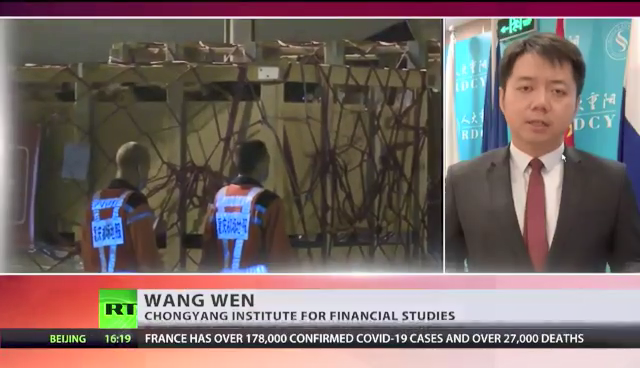
Wang Wen accepted RT interview: Chinese people were dissappinted with Australia
If China didn't start the conflict with America, Wang Wen think that the world will become worse and worse.
2020-05-15 -
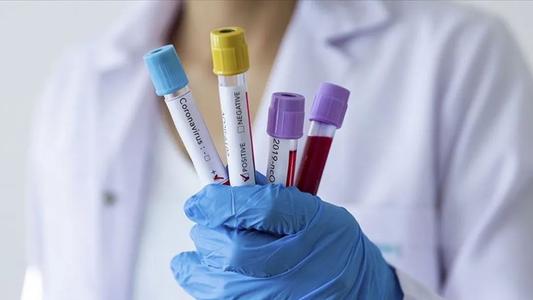
John Ross: Why countries should learn from China’s fight against COVID-19
Faced with COVID-19’s onslaught, not one single life will be saved in any country by propaganda, politicization of the crisis or similar diversions. On the contrary, many lives are lost as a result of these – because they obstruct the necessary lessons to fight the virus’s attack. As bluffing will not stop the coronavirus, only correct actions will, it is therefore vital every country learns lessons from China’s successful handling of this crisis.
2020-05-14 -
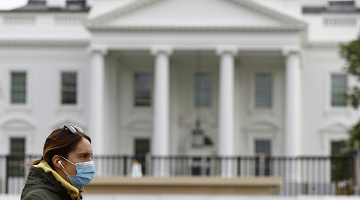
The dumbing-down of America and the Anglo-American 'virus'
Many international observers have been shocked when they look at the United States and see, in the midst of the greatest pandemic in the century, college kids romping on the beaches, or demonstrators at state capitols without masks demanding an end to quarantine, or internet campaigns warning about the dangers of being vaccinated.
2020-05-14 -
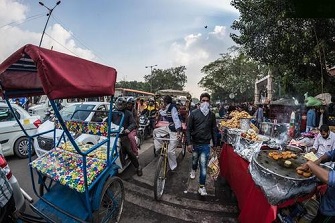
Lin Minwang: Vitriol in Indian media can only poison relations with China, at a time when cooperation is needed in coronavirus fight
The World Health Organisation has praised India’s lockdown measures at an early stage. Nevertheless, the government is facing a storm of media criticism, including accusations of unreliable data on infection numbers and the death toll, and on the measures’ adverse impact on daily-wage workers. The harshest criticism has been aimed at New Delhi’s handling of the hate propaganda against minority groups, specifically Muslims.
2020-05-14 -
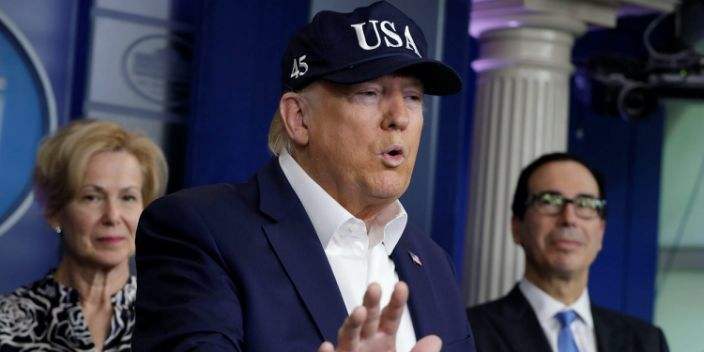
John Ross: Deadly US policy on Covid-19 will split the world in two and force countries to rethink old alliances
The Donald Trump administration’s failure to take the coronavirus seriously won’t only cause thousands of unnecessary deaths, it could change the global political map for good. The US is now a deadly threat to every person on the planet – that is the inevitable result of Washington’s decision to lift even its very limited lockdown despite the fact the virus continues to rage with full force within the American borders.Domestically, this will mean the death of tens of thousands more Americans, creating a casualty toll on US soil comparable only to the 1918 Spanish flu epidemic and the Civil War. But the international consequences will see the world divided into two zones.
2020-05-13 -

William Jones:Chinese Success in Fighting COVID-19 Should Be a Lesson for the West
The world was quite taken aback by the sudden eruption of a novel coronavirus as it began to make its appearance in Wuhan, the capital city of central China’s Hubei Province, with a population of 11 million. Not only the world, but also Chinese authorities were initially unaware about the nature of what they were dealing with when a series of “pneumonia-like cases of unknown origins” began to appear.
2020-05-12 -

Wang Wen: Wake up world: Chinese youth wave coming
The other day, my son recommended me a piece of 8K music, which means music produced with a high-tech display resolution with superior clarity and depth. As I put on the headphones, it felt like I was surrounded by a full 360-degree wave cycle.
2020-05-12
























































































 京公网安备 11010802037854号
京公网安备 11010802037854号





